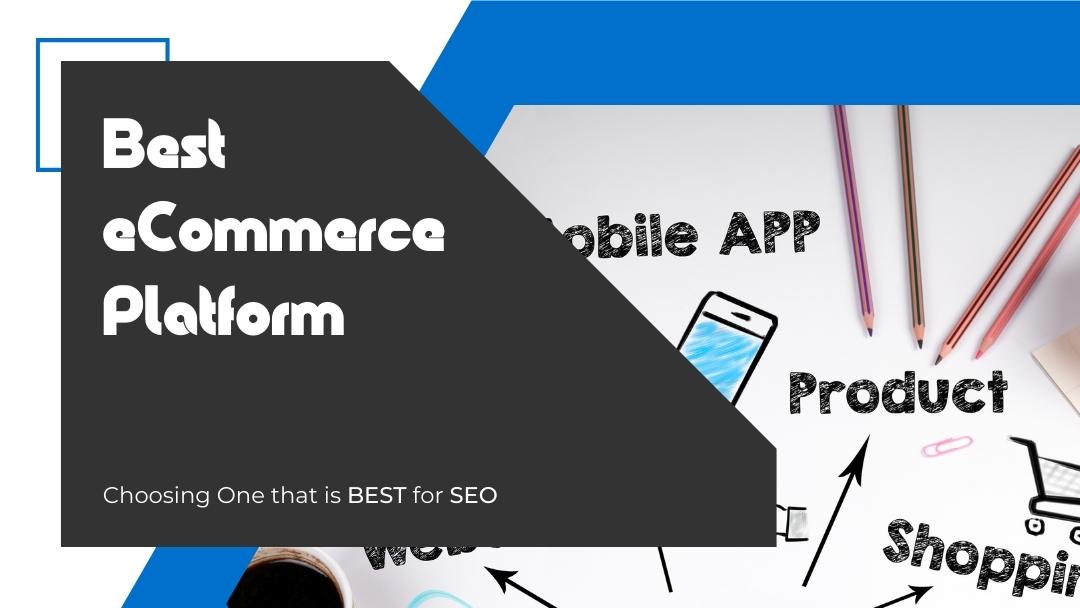Choosing the best eCommerce platforms
Are you stuck trying to figure out which eCommerce platform is best for SEO? You’re not alone! It’s a confusing question because everywhere you turn online, there’s a different opinion and most of those articles are written by paid affiliates of one platform or another. So, who can you trust? It’s a tough decision that will have a long-term impact on your revenue.
There are sooo many different eCommerce platforms on the market! It’s difficult to understand how they all work and figure out the pros and cons of each one. Not all platforms are created equal, and some are much better suited for SEO than others. Let’s get past the hype and give you an unbiased look at your e-commerce platform options from the standpoint of an experienced agency that’s not getting paid to push anything from a 3rd party.
In this article, we’ll explore the most common eCommerce platforms and help you decide which one is best for your site’s SEO. How we decided on this list is quite simple. It’s all based on data and real-world observations. I’m Blake and I lead the search engine optimization team at Webology. Over many years, we’ve had the opportunity to work for different clients who came to us with every possible website platform imaginable! We’ve seen enough examples of real-world online businesses to draw our own conclusions on the best eCommerce SEO platform, and we’re not holding anything back in this review. Let’s get started by understanding some basics of online shopping.
What is an eCommerce Platform?
An eCommerce platform is a software solution that enables businesses to build and launch an online store.
The platform provides a webspace for businesses to showcase and sell their products or services, along with a range of features and tools to manage inventory, process payments, track shipping, and do more amazing things on the back-end.

While there are many different types of eCommerce platforms available, they all share the same goal: to provide businesses like yours with an easy and cost-effective way to reach an online audience.
Choosing the right eCommerce platform is essential for any business that wants to succeed with direct-to-consumer sales in the digital age. It’s a must to consider your needs and budget when selecting a platform, as well as the features and functionality that are the most important to you. Do you need integration with a particular payment gateway? Will you accept crypto for payment? How about taxes, shipping and labeling concerns? If the platform you choose has limited eCommerce integrations, it can cause headaches down the road after you’ve already invested time and money into development costs. That’s why it’s important to take the time to choose the best solution from a technical standpoint first.
With so many options available, finding the eCommerce platform that suits your needs can be a daunting task. However, taking the time to find the right platform will pay off in the long run by helping you develop a successful online business on a platform that meets all your business goals.
How important is SEO for an eCommerce businesses?
As an eCommerce business, it’s essential to focus on SEO if you want to reach a larger audience. SEO, or search engine optimization, is the process of improving the visibility and ranking of a website in search engine results pages.
By optimizing your website for search engines, you can attract more visitors and increase traffic to your store without having to resort to paid advertising. And while you should definitely consider a well-optimized ad campaign, it’s nice to have a revenue source that’s not beholden to a cost per click.
SEO is especially important for eCommerce businesses, as many shoppers use search engines to find products online. In fact, according to Statista 40% of all online product searches start with a search engine.
As a result, it’s crucial to make sure your eCommerce store is optimized for search engines if you want to reach potential customers.

There are many different factors that contribute to a website’s eCommerce SEO, including the quality of the content, the structure of the website, the keywords used, and more. However, one of the most important factors is the platform that your website is built on. Each one takes a slightly different approach to how your code is displayed. Almost all of them offer their own set of eCommerce SEO tools, and they’re definitely not all created equal! Some are much better than others.
Different eCommerce platforms have different levels of SEO functionality. Some platforms are designed with SEO in mind, while others offer basic SEO features as an afterthought because many online businesses limit themselves and strictly rely on PPC to generate sales.
When selecting an eCommerce platform, it’s important to consider how well the platform supports SEO so that you can choose a platform that will help you reach your target audience through organic means. SEO can work well with PPC and in my opinion, you need both to be successful these days.
Related Post: eCommerce Brand Sees 86.20% Organic Traffic Growth
The Many Different Types of eCommerce Platforms
There are generally two types of eCommerce platforms to choose from, namely hosted and self-hosted platforms. There are a few pros and cons to each option you need to be aware of and we’ll cover them in detail below.
Hosted Platforms
Hosted eCommerce platforms offer the best option in terms of ease of use. They are fully managed by the eCommerce provider. This means that the eCommerce provider takes care of all the technical aspects of running an online store, such as hosting, security, and updates.
The advantage of using a hosted platform is that it is easy to set up and use, and you don’t need to worry about the technical aspects of running an online store. The most well-known example of this would be Shopify. These are great for DIY beginners who may not have the budget to hire an expert management just yet.
The downside of using this type, however, is that you don’t have as much control over your website as you do with a self-hosted platform. In addition, hosted platforms generally charge monthly fees, which can add up over time.
Self-Hosted Platforms
A self-hosted eCommerce platform is a platform that you host yourself. This means that you are responsible for taking care of all the technical aspects of running an online store, such as hosting, security, and updates.
The advantage of using this type of platform is that you have full control over your website.
The downside of using a self-hosted platform is that it can be more difficult for new users to set up, and you need to be familiar with the technical aspects of running an eCommerce site.
In addition, self-hosted products generally require you to pay for hosting and other features separately.
Examples of self-hosted eCommerce platforms are WooCommerce and Magento.
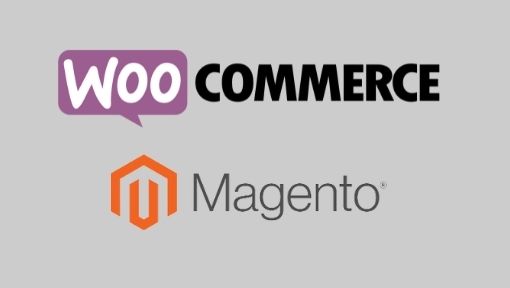
Now that you know the different types of eCommerce platforms, let’s take a look at some of the features to look for in an eCommerce platform.
What to Look for in an eCommerce Platform
When choosing an eCommerce platform, there are a few key features to look for:
Ease of Use
First on the key features to look for is that it should be easy to use, even if you don’t have any technical knowledge. It should be easy to add products, create categories, and set up shipping and payment methods.

In addition, the platform should have a user-friendly back-end interface so that you can easily manage your website.
Built-in SEO Features
The platform should have built-in SEO friendly features to help you optimize your website for search engines. These features might include automatic generation of title tags and meta descriptions, support for sitemaps, the ability to monitor URL performance and more.

Responsive Themes
Having responsive designed themes is crucial in an eCommerce platform so that your website looks good on all devices, from desktop computers to mobile phones and tablets. Having a bad user experience on the devices your users most commonly visit your site from will literally cause lost revenue as people leave your site to search for a competitor that’s easier to buy from. The times when you could get away with an out-of-date design and still make money are completely over.

Customer Support
Excellent customer support is also a must-have in an eCommerce platform since your customers may need help at any time and having someone available to assist them is very important for your brand’s reputation.
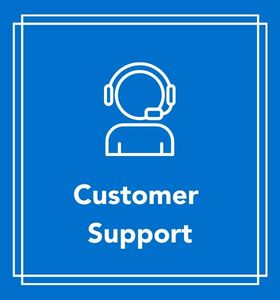
Pricing
The platform should be cost-efficient, with no hidden fees. In addition, it should offer a free trial so that you can try out the SEO features before committing to it.

How to Choose the Best eCommerce Platform for SEO
Now that you know the different types of eCommerce platforms and what to look for in an eCommerce platform, it’s time to choose the best one for your needs.
Here are a few factors to consider when choosing an eCommerce platform:
Do You Need a Hosted or Self-Hosted Platform for Your Site?
The first factor to consider is whether you need a hosted or self-hosted platform. If you’re not sure which type of platform to choose, we recommend starting with a hosted platform since they’re generally easier to use and don’t require any technical knowledge.
How Much Control Do You Need Over Your Website?
If you need full control over your website, then a self-hosted platform is the way to go. You’ll have access to edit every detail of your site code, but that access comes with a cost of its own. You can either spend time learning HTML or money hiring a developer. The problem you might face is that either you or your developer won’t typically also be well-versed in the search engine optimization side of things. However, a great SEO can partner with you or your dev team to make sure simple mistakes like missing H1 tags or empty image alt tags don’t hold your website back from the revenue it deserves. When budgets permit, our opinion is that you should actually spend less on the software and more on expert help from someone experienced in organic strategy.
How Much Are You willing to Spend?
Hosted platforms usually charge monthly fees, while self-hosted platforms generally require you to pay for hosting and other features separately. Therefore, you need to consider how much you are willing to spend on an eCommerce platform. Other costs can include plugins, the consulting fees and agency retainers that we discussed above, or even the costs of accessing and integrating with inventory databases.
What Features Are Important to You?
When choosing an eCommerce platform, make sure to consider what features are the most important to you. If ease of use is a priority, then look for a service that’s easy to use with a user-friendly back-end interface.
On the other hand, if you need an SEO-friendly platform, then look for a platform with the best built-in SEO features.
The Best eCommerce Platforms for SEO
Although there are a handful of eCommerce site options out there, not all of them may be best suited for SEO.
To help you significantly narrow down your options, we have listed the best eCommerce platforms for SEO below. Here they are and we saved the best for last, so read on to really understand your buying choices before you commit to anything.
#5 – Wix
Wix is a great website builder that has eCommerce functionality. It’s extremely user-friendly and offers a range of features to help you build a successful online store.

Like Squarespace, all Wix themes are responsive and mobile-friendly. In addition, Wix offers built-in support for sitemaps as well as detailed analytics. Site speed, ease of use and responsiveness are all advantages of using Wix. If your budget is small, this is a great way to DIY the work and get things off the ground early on.
#4 – BigCommerce
BigCommerce is another good eCommerce platform that offers a range of features to help you build a successful online store. It’s designed to be scalable, so it can grow with your business.

It offers a range of features to help you optimize your website for search engines, including built-in support for sitemaps, automatic generation of title tags and meta descriptions, and more.
In addition, all BigCommerce themes are responsive, meaning they adjust to different screen sizes.
#3 – Squarespace
Squarespace is a popular website builder that offers eCommerce features. While it’s not as comprehensive as Shopify or WooCommerce for WordPress, it’s still a very SEO-friendly platform.

All Squarespace themes are responsive and mobile-friendly, which is important for SEO. In addition, Squarespace offers built-in support for sitemaps and provides detailed analytics so that you can track your SEO progress.
#2 – Shopify
Shopify is one of the most popular eCommerce platforms on the market. It’s a fully-hosted platform, which means that Shopify takes care of all the technical aspects of running an online store.
This leaves you free to focus on other aspects of your business, such as marketing and product development.

It is also one of the most user-friendly eCommerce platforms. It offers a range of features that make it easy to optimize your website for search engines. For example, Shopify automatically generates sitemaps, which help search engines index your website more effectively.
In addition, all Shopify themes are responsive, meaning they adjust to different screen sizes, making it easy for users to navigate your website on any device.
Finally, Shopify provides detailed analysis and reporting tools so that you can track your SEO progress and identify areas for improvement.
#1 – WordPress – The Very Best CMS for SEO
WordPress is the most popular content management system (CMS) in the world, powering over 30% of all websites. There’s a reason for that…WordPress gives site owners the highest level of control and functionality. While it’s primarily known as a blogging platform, WordPress can also be used to create an online store thanks to the WooCommerce plugin. If you have the budget for it, we highly recommend building your store properly from the ground up in WordPress.

One of the main reasons why WordPress is so SEO-friendly is that it offers complete control over your website’s code. This enables you to make changes to your website that can help improve your search engine ranking in ways you simply cannot access with other software.
For example, you can easily add title tags and meta descriptions to products and pages just like all the others we’ve reviewed so far. But going beyond that, WordPress allows you to easily insert important product schema codes into your pages. You can easily perform bulk image compression and optimization with a simple plugin. If your site is unoptimized, you’ll save time with bulk-edit features like find and replace or the ability to automatically fix all missing alt tags sitewide through a plugin like RankMath. In addition, all modern WordPress themes are responsive and there’s so many for you to choose from.
Why is WordPress our Top Pick?
As the most popular content management system, WordPress offers a number of advantages for those looking to create an online store. Below are the compelling reasons why WordPress is the best eCommerce platform for your business.
First, it’s important to note that WordPress is open source software, which means that it’s free to use. This is a significant advantage over closed source platforms like Shopify, which charge monthly fees.

Second, WordPress gives you complete control over your website’s code. This enables you to make changes to your website that can help improve your search engine ranking.
For example, you can easily control your robots.txt file and fully edit your HTML sitemap, when some paid services don’t even allow you access to those areas of your website.

Third, all WordPress themes are responsive and when properly optimized they’re fast, which is important for SEO. Responsive design ensures that your website looks good on all devices, from desktop computers to mobile phones. This is important because Google now uses mobile-friendliness as a ranking factor in its search results. Site speed out of the box in WordPress is all what you make of it. It can be much faster than the closed-source platforms, but you’ll have to tune it and pay for premium hosting if you want the best results.

Finally, WordPress is backed by a large community of developers who create themes and plugins that you can use to extend the functionality of your website. For example, there are eCommerce plugins like WooCommerce that you can use to turn your WordPress website into an online store.

Why the Best SEO Teams Choose WordPress
As a final note to help you understand just how powerful WordPress is, I wanted to suggest a simple competitor analysis test that you can do yourself to help you decide. What’s your most important keyword you want to rank for? Whatever it is, go to Google and take a look at the top 10 URLs that have earned a spot on page 1. You should be able to navigate to each link and right-click somewhere on their page to select ‘View page source’.
Go through all 10 of them and use CTRL+F [In Chrome] to search for the word WordPress in their HTML code. Did you even find a single site ranking for your keyword that’s NOT built in WordPress? Crazy, huh? Usually, there’s less than 2-3 in almost every niche because for whatever reason, Google tends to reward WordPress sites with higher rankings. So, that’s why many SEO teams like ours prefer WordPress for both local websites and also eCommerce. We’ve tested and proven that it works better than anything else and we have years of experience to back up that claim.
Related Post: How to Beat a Competitor’s SEO
The Benefits of Using an eCommerce Platform
Any business that sells a product and wants to stay competitive in today’s market needs to have an eCommerce platform. An eCommerce platform is an online system that allows businesses to sell electronically through automation.
There are many benefits of using an eCommerce platform, including the following:
An eCommerce platform gives businesses a larger reach as they are no longer limited to selling to customers in their local area. Customers can purchase items from anywhere in the world. In addition, an eCommerce platform provides businesses with the ability to sell 24/7, which is not possible with a brick-and-mortar store.
It is less expensive than opening a physical store. There are no real estate costs or expenses associated with maintaining a physical location. In addition, businesses can save on inventory costs as they only need to purchase items as they are needed, rather than stocking a physical store with merchandise.
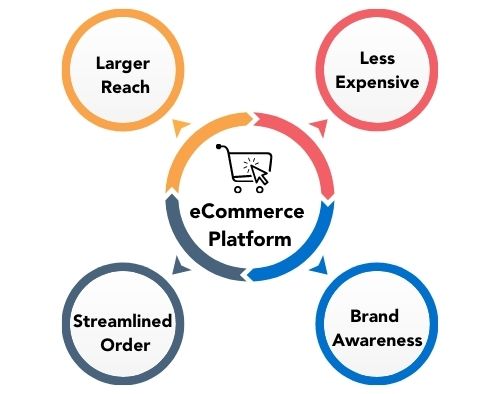
Streamlined order processing. An eCommerce platform automates many of the tasks associated with running an online store, such as order processing, shipping, and inventory management. This frees up business owners to focus on other aspects of their business.
Build brand awareness and create loyalty among customers. By providing a convenient and user-friendly experience, businesses can encourage customers to keep coming back.
Overall, there are many reasons why businesses should use an e Commerce platform.
Any business that wants to stay competitive and continue to grow needs to embrace this technology.
How to Optimize an eCommerce Platform for SEO
Now that we’ve looked at the top eCommerce platforms for SEO, let’s explore some general tips and strategy that you can use to optimize any platform for search engines.
Choose a responsive theme. As we mentioned earlier, all of the platforms on our list offer responsive themes. However, not all themes are created equal. Some themes are better optimized for SEO than others.
When choosing a theme, look for one that offers features like large CTA buttons that stand out and a way to organize your category pages with useful information about each product.
Make sure that your website is well structured and organized. This means creating clear and concise product pages with unique titles and descriptions. As well as using descriptive URLs that include keywords.
Make sure that your website is fast on wireless networks. Users expect websites to load quickly, and if they don’t, they are likely to leave before even seeing your content. In addition, Google has stated that page speed is a ranking factor in its search algorithm.
Create keyword-rich blog content. In addition to product pages, your eCommerce website should also have a blog. Not only do blogs give you an opportunity to rank for long-tail keywords, but they also help to promote your product and service pages through internal linking.
Make sure to include relevant keywords in your blog posts, as well as in the titles and meta descriptions.
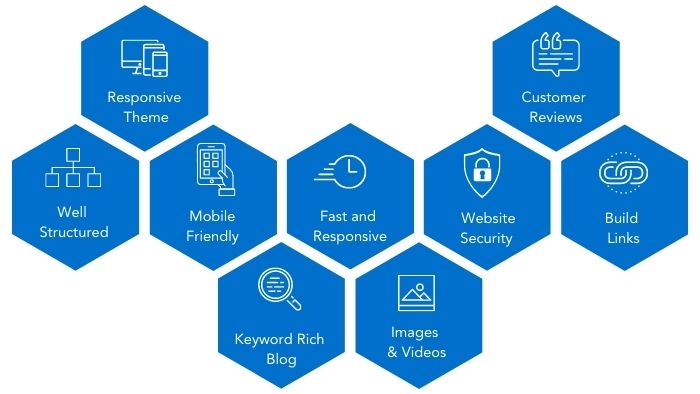
Use images and videos. In addition to text, uploading high quality images and videos to your website is also a must. These can help to break up your content and make it more visually appealing.
In addition, search engines like Google can index images and videos, which can help to improve your website’s ranking in the search results.
Include customer reviews and testimonials. Customer reviews are a valuable source of information for potential customers. They help to build trust and credibility with your audience. In addition, Google uses customer reviews as a ranking signal in its search algorithm.
Make sure that your website is secure. Security is important for both users and search engines. Users need to know that their personal information is safe when they visit your website, and search engines need to know that your website is free of malware. You can increase your website’s security by installing an SSL certificate. The presence of an SSL is not only required by most merchant services, but it is also a direct Google ranking factor as well. So, you definitely need to invest the few extra dollars it costs each year to keep yours up-to-date.
Build links to your website from high-quality directories. Directory listings make for an easy win. They’re easier to acquire than guest post links and can help to improve your website’s visibility and authority at a lower cost. Look for directories that are relevant to your industry or niche, and make sure to include keywords in your listings.
As you can see, there are many factors that you need to consider when optimizing an eCommerce platform for SEO.
By following the tips above, you can ensure that your platform is ready to take your business’ digital marketing strategy to the next level.
Conclusion
When choosing the best eCommerce platform for SEO, It all boils down to your company’s needs and goals. By taking the time to consider what’s important to you, you can narrow down the options and choose the platform that’s right for your business. If you still need help, feel free to reach out to our team. We can either audit your existing site or help you build a new one that launches fully optimized for search engines.

